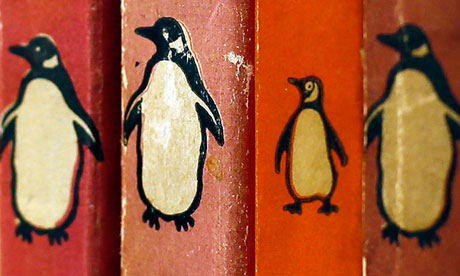There is huge affection among readers for the Penguin brand, but like other companies it has had to face changing times

Generations have bookshelves stuffed with Penguin Classics. Photograph: Stefan Wermuth/Reuters
Jokes about the name of the new Random House/Penguin megahouse began circulating within minutes of merger talks being announced. As one wag pointed out, Randy Penguin is probably a better beast than the Murderous bird that might have issued from a coupling with Rupert Murdoch's News Corporation. But what will the deal mean for those who write and read the books they publish?
"Three to five years of instability for everyone" was the response of one industry insider to the announcement that neither could buy the other out within that period. Penguin is the junior partner in the deal, though in the UK there is a huge affection for the brand, with its cheerful avian icon that is not so pompous as to escape occasional playful shapeshifts (it appeared on a recent series of food books holding a knife and fork).
Generations who were weaned on Kaye Webb's Puffin club still have bookshelves stuffed with scuffed Penguin Classics. Its imprints carry some of the proudest names of publishing history – Allen Lane or Hamish Hamilton – but in reality this canny anthropomorphism disguises a company that has been struggling as hard as any other to keep its head and profits above the flood of change that has inundated the industry over the past few years.
The new company will clearly be looking at economies of scale, not just in warehousing, printing and finance systems, but eventually in editorial output. Random House and Penguin, for instance, have classics imprints at a time when many of the texts they publish are freely available on the internet through Project Gutenberg. Once the Digital Library of America is up and running – a 2m-book archive that has been promised by the end of next year – this wing of the business will look even less airworthy. It is easy to see the arguments for amalgamating the two.
At least the classics divisions do not affect many living authors. The fear among those who are still writing is that the loss of competition will drive advances and royalties down, while narrowing the range of books published. Backlists in particular are likely to suffer, since the logic of amalgamation is that 1 + 1 is more likely to add to 1.5 than 2. Any overall reduction in backlist will affect the range of books available and the reputations and incomes of the authors who wrote them.
In a letter to Random House's authors on Monday, the chairman, Markus Dohle, assured them: "When we join together we will be retaining the distinct identities of both companies' imprints … we will build on the history and heritage of each of our storied brands." Yet each publishing house already has rules against internal bidding wars within divisions. Authors are surely right to fear the consequences if these are extended through a business with a 25% share of the UK market.
However, for writers, as for readers, the key thing is that some sort of publishing industry survives – and this deal is unlikely to be the last, as so-called "legacy publishing" attempts to square up to the threat posed by Amazon's online monopoly. Independent publishers are not blind to the advantages: "They can take on the big battles and we'll skirmish on the sidelines," said one, who declined to be named.
Few insiders feel News Corp was a serious contender to take over Penguin, as reported at the weekend, but Hachette, which has Little, Brown and Virago under its wing, is rumoured to be in buying mood and unlikely to settle for a place in the second division. So watch this space
"Three to five years of instability for everyone" was the response of one industry insider to the announcement that neither could buy the other out within that period. Penguin is the junior partner in the deal, though in the UK there is a huge affection for the brand, with its cheerful avian icon that is not so pompous as to escape occasional playful shapeshifts (it appeared on a recent series of food books holding a knife and fork).
Generations who were weaned on Kaye Webb's Puffin club still have bookshelves stuffed with scuffed Penguin Classics. Its imprints carry some of the proudest names of publishing history – Allen Lane or Hamish Hamilton – but in reality this canny anthropomorphism disguises a company that has been struggling as hard as any other to keep its head and profits above the flood of change that has inundated the industry over the past few years.
The new company will clearly be looking at economies of scale, not just in warehousing, printing and finance systems, but eventually in editorial output. Random House and Penguin, for instance, have classics imprints at a time when many of the texts they publish are freely available on the internet through Project Gutenberg. Once the Digital Library of America is up and running – a 2m-book archive that has been promised by the end of next year – this wing of the business will look even less airworthy. It is easy to see the arguments for amalgamating the two.
At least the classics divisions do not affect many living authors. The fear among those who are still writing is that the loss of competition will drive advances and royalties down, while narrowing the range of books published. Backlists in particular are likely to suffer, since the logic of amalgamation is that 1 + 1 is more likely to add to 1.5 than 2. Any overall reduction in backlist will affect the range of books available and the reputations and incomes of the authors who wrote them.
In a letter to Random House's authors on Monday, the chairman, Markus Dohle, assured them: "When we join together we will be retaining the distinct identities of both companies' imprints … we will build on the history and heritage of each of our storied brands." Yet each publishing house already has rules against internal bidding wars within divisions. Authors are surely right to fear the consequences if these are extended through a business with a 25% share of the UK market.
However, for writers, as for readers, the key thing is that some sort of publishing industry survives – and this deal is unlikely to be the last, as so-called "legacy publishing" attempts to square up to the threat posed by Amazon's online monopoly. Independent publishers are not blind to the advantages: "They can take on the big battles and we'll skirmish on the sidelines," said one, who declined to be named.
Few insiders feel News Corp was a serious contender to take over Penguin, as reported at the weekend, but Hachette, which has Little, Brown and Virago under its wing, is rumoured to be in buying mood and unlikely to settle for a place in the second division. So watch this space

No comments:
Post a Comment